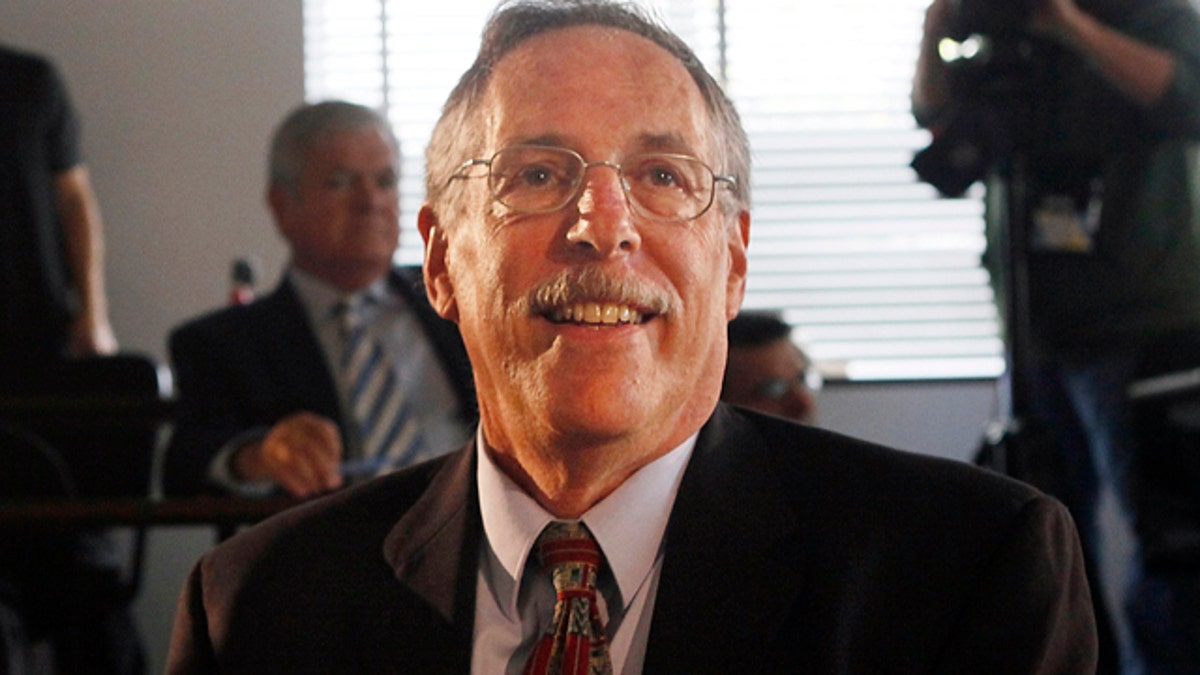
Oct. 11, 2010: Massachusetts Institute of Technology economics professor Peter A. Diamond smiles before the beginning of a news conference after learning he is one of three economists to win the 2010 Nobel Prize in economics. (AP)
Peter Diamond may have won the Nobel Prize for economics, but it remains to be seen whether that will sway any Republican lawmakers who opposed his nomination to the Federal Reserve Board of Governors.
Diamond, 70, a professor at the Massachusetts Institute of Technology and a former instructor to current Federal Reserve Board Chairman Ben Bernanke, was nominated by President Obama to serve on the board, and while his nomination was approved by the Senate Banking Committee, the vote never came to the floor.
The top Republican on the banking committee said on July 28 when the committee voted on the nomination that Diamond isn't versed enough in macro-economics.
"I think that professor Diamond is a skilled economist and certainly an expert on tax policy, and on the Social Security system. Our government could certainly benefit from Professor Diamond's expertise," said Sen. Richard Shelby, R-Ala. "However, I do not believe that he is ready to be a member of the Federal Reserve Board. I do not believe that the current environment of uncertainty would benefit from monetary policy decisions made by board members who are learning on the job."
Shelby did not place "a hold" to stop the nomination from coming to a vote, but someone apparently did. And since Diamond never got to a vote before senators left for their August recess, Obama had to resubmit it. Banking Committee Chairman Chris Dodd, D-Conn., said he would hold another vote, reportedly during the lame-duck session in November.
Still, the White House was miffed that an award-winning economist wouldn't pass the Republican sniff test.
"Despite being heralded by the Nobel Committee for his groundbreaking work with applications in a wide range of areas like unemployment and housing, Peter's nomination to the Federal Reserve Board of Governors continues to be held up by a partisan minority in the Senate," White House spokesman Robert Gibbs said Monday after Diamond's award was announced.
"Obstructing a nominee as well-qualified as Peter in a time of economic crisis is a harmful attempt to score political points that hurts our middle class and our broader economic recovery," Gibbs said.
But Shelby told FoxNews.com that he wasn't moved.
"While the Nobel Prize for Economics is a significant recognition, the Royal Swedish Academy of Sciences does not determine who is qualified to serve on the Board of Governors of the Federal Reserve System," Shelby said in a written statement.
Diamond was awarded the $1.5 million prize along with Dale Mortensen and Christopher Pissarides for their analysis of the obstacles that prevent buyers and sellers from efficiently pairing up in markets.
The work, dating back to the 1970s and '80s, surmises how conditions that are perfect for pairing buyers and sellers in the housing market don't always end in a match in the real world.
Another area where the economic model by Diamond, Mortensen and Pissarides applies is the labor market when suitable employers and employees don't meet.
The model shows how unemployment benefits, interest rates, the efficiency of employment agencies and other factors can affect the labor market. Diamond wrote at the time of his research that the better the unemployment benefits, the longer it takes to make a match. But because people with the support system take the time to look for the best match, ultimately it leads to greater efficiencies in the marketplace.
The Associated Press contributed to this report.




